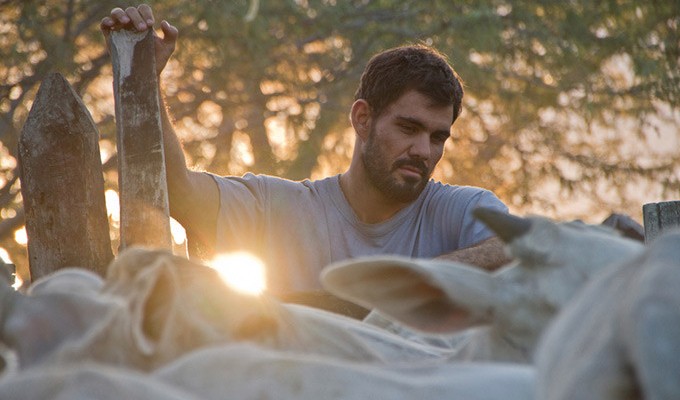Iremar (Juliano Cazarré) is a roughneck. He’s a cowboy, a bull handler really, wrangling bulls into and out of a shoddy rural Brazilian rodeo. It’s dusty, difficult work, and the shows themselves are brutal, the bulls entering into a ring where two riders attempt to bring them down. The arena is spattered with the lost tail tassels of the bulls, ripped off by the riders. Iremar dutifully collects these tails, for use in his fantastical costume designs. So yes, Iremar might be a roughneck, but he’s a roughneck with dreams of designing delicate women’s bikinis and clothing. Don’t judge a book by its cover.
The question of appearances and their complicated meanings is at the heart ofGabriel Mascaro’s remarkable and arresting “Neon Bull.” The film centers on Iremar and the nomadic group with whom he lives and works. Galega (Maeve Jinkings) drives the truck that serves as their sleeping quarters, and performs eerie burlesque numbers for rowdy rodeo fans in wild, sexy horse costumes of Iremar’s design. Her daughter, Cacá (Alyne Santana), brings the innocent element to the rough, masculine camp. There are also bull wranglers Mário (Josinaldo Alves) and Zé (Carlos Pessoa), marked by his rotund shape and simple mind. Somehow, they create a little family unit that manages to work. They squabble and fight in their cramped quarters, but they have their routine and they stick to it.
“Neon Bull” is largely concerned with bodies, primarily the dual nature of bodies, for both performance and presentation. The bulls exemplify this juxtaposition — they are roughly packed into rickety trailers, shuttled into chutes with no regard for their space, squashed and grunting on top of each other. They’re then put on display, their downfall the evening’s entertainment. One night, Iremar coats one of the bulls in neon paint powder as the announcer declares it’s the portion of the evening everyone’s been waiting for — the Neon Bull, the spectacle of the painted bull’s body.
This same question of form and function exists for the humans. Though they live in dismal camping conditions, Iremar and Galega are concerned not just with their bodies as tools for work, but for being seen. Galega gives herself a bikini wax in the cab of the truck, while Iremar splashes himself with cologne and doodles his clothing designs onto Zé’s girly mags. Attention is paid to their daily ablutions, and the small vanities they allow themselves. A new cow hand, Júnior (Vinícius de Oliveira), has braces on his teeth and flat irons his long hair in a small mirror in the makeshift outdoor camp every morning.
The plot loosely follows Iremar as he attempts to pursue his dreams outside of the rodeo, but the closest he gets to his goal of working in a clothing factory is romancing a perfume saleslady, Geise (Samya De Lavor), who moonlights as a security guard in the factory. When he visits her there, he seems almost aroused by the industrial sewing machines as he describes his ambitions to her. It culminates in a stunning and beautifully-shot sex scene, performed in real time over one long unbroken take. The lighting is gorgeous, as Iremar’s sexual energy and charisma are finally released. Once again the question of bodily appearances and meaning is thrown into question, as Geise is fully pregnant, but her body presented in a sexual way. The realism of the scene demonstrates Mascaro’s skill in directing, for which he took home top honors, winning the directing prize from the Jury in Marrakech. The only qualm would be that the film reaches its climax at this point, and the perfunctory ending after this seems tacked on and could never live up to the penultimate scene.
Cazarré is a movie star in Brazil, and his authentic and unassuming performance in “Neon Bull” should launch him onto a global international stage. His Iremar feels of this world, skin made of dust and muscled from wrestling with the bulls. Mascaro’s film is an auspicious, original, and absorbing work that thrills with its look into this little-seen world and the dreamers that inhabit it. [B+]
This is a reprint of our review from the 2015 Marrakech International Film Festival.

